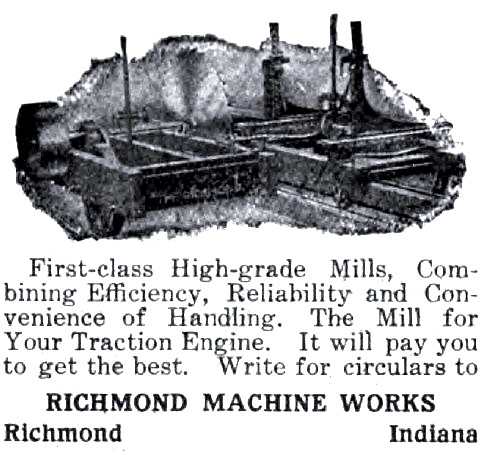This firm was established in 1860 by Joseph M. Bayleis and Andrew Vaughan as Bayleis, Vaughan & Co., incorporating under that name in 1872, with Benjamin P. Perry replacing Bayleis as president. In 1882 the company reorganized as Richmond Machine Works. The company survived until at least 1907 but probably not much longer than that.

Advertisement from May 1907 American Thresherman
Information Sources
- Thanks to Jason Willoughby for bringing Richmond Machine Works to our attention via a posting on the SmokStak forum. A sawmill bears a brass plaque reading, "RICHMOND MACHINE WORKS / ENGINES & SAW MILLS / RICHMOND, IND.
- Listed in the 1874 work, Wiley's American iron trade manual of the leading iron industries of the United States: "Bayless [sic] Vaughan & Co., Portable and stationary engines, saw-mills, etc. Established 1855. Number of hands employed, 40."
- History of Wayne County, Indiana, 1884:
Richmond Machine Works were originally established in 1860 by Bayleis, Vaughan & Co. and continued by them until 1872, when it became an incorporated company with a capital stock of $100,000, under the same name and stockholders, and in 1882, ten years later, assumed the name at the head of this article. Jos. M. Bayleis, as President, and And. Vaughan, Secretary, were the first officers of the company in 1872, and the former was succeeded by B. P. Perry, a leading stockholder in the company, in July of the same year. Mr. Perry is still President. In 1874 Mr. Vaughan retired from the secretaryship, and Mr. L. H. Bunyan assumed the office and still holds it.
Their work embraces saw-mills, engines, tile-mills and general work manufactured in such establishments. They have a forty horse-power steam-engine and employ an average of fifty hands throughout the year. The buildings composing their extensive works are as follows:
- Finishing room 40 x 80 feet.
- Blacksmith shop .25x 50"
- Foundry 50 x 100"
- Wood-work shop 30 x 60"
- Another of same 40 x 60"
- Pattern shop 40 x 40"
- Pattern room .40 x 60"
- Wood-workroom 30 x 60"